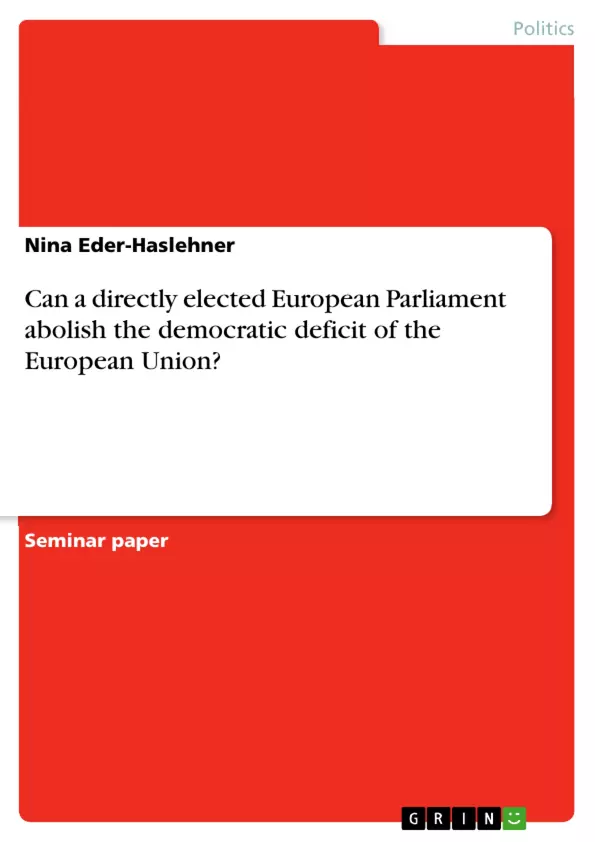“As politicians we have to react to the fact that many people do not feel that they can relate to the EU.” Angela Merkel
For 52 per cent of Germany’s population a strong, democratic co-termination is the most crucial element of a European identity (Aktion Europa) but when we observe the European Union or more specifically the European parliament, the question occurs if the EU is suffering from a democratic deficit and if the directly elected Parliament is able to abolish this deficit. The aim of the essay is to discuss that question.
Inhaltsverzeichnis (Table of Contents)
- Introduction
- In General
- The 2009 European Parliament's election
- The history of the European Parliament's election: from indirect to direct representation
- The European Parliament – an appropriate instrument for demolishing the democratic deficit?
Zielsetzung und Themenschwerpunkte (Objectives and Key Themes)
This essay examines the question of whether a directly elected European Parliament can abolish the democratic deficit of the European Union. It analyzes the historical development of the European Parliament, from indirect to direct representation, and explores the effectiveness of the institution in addressing concerns about democratic legitimacy. The essay also discusses the 2009 European Parliament elections and their implications for the future of the institution.
- The democratic deficit in the European Union
- The role of the European Parliament in addressing the democratic deficit
- The history of the European Parliament's elections
- The 2009 European Parliament elections and their implications
- The potential of the European Parliament to enhance democratic legitimacy in the EU
Zusammenfassung der Kapitel (Chapter Summaries)
- Introduction: The essay introduces the concept of the democratic deficit in the European Union and the potential of the directly elected European Parliament to address this issue.
- In General: This section provides an overview of the general features of European Parliament elections, including the frequency, voting regulations, and electoral system. It also discusses the inconsistencies in electoral rules among member states and the ongoing efforts to harmonize the electoral process.
- The 2009 European Parliament's election: This chapter summarizes the 2009 European Parliament elections, highlighting key results, voter turnout, and the rise of right-wing populist and euro-critical parties.
- The history of the European Parliament's election: from indirect to direct representation: This section examines the historical evolution of the European Parliament, tracing the transition from indirect to direct representation and the challenges encountered along the way. It explores the rationale behind the initial reluctance to hold direct elections and the factors that ultimately led to their implementation.
Schlüsselwörter (Keywords)
This essay focuses on the European Parliament, democratic deficit, direct elections, European integration, legitimacy, representation, proportional representation, voter turnout, and the historical development of the European Union. It analyzes the effectiveness of the European Parliament as an instrument for enhancing democratic legitimacy and addresses concerns about the democratic deficit in the European context.
Frequently Asked Questions
What is the "democratic deficit" in the European Union?
It refers to the perceived lack of democratic accountability and accessibility in EU institutions, where citizens feel they have insufficient influence over decision-making processes.
Can a directly elected European Parliament solve this deficit?
The essay discusses whether direct elections provide enough legitimacy to bridge the gap between EU citizens and the political leadership, analyzing its effectiveness as a democratic instrument.
When did the European Parliament transition to direct elections?
The essay explores the historical shift from indirect representation (appointed by national parliaments) to direct elections by EU citizens, highlighting the challenges of this evolution.
What was significant about the 2009 European elections?
The 2009 elections were marked by specific voter turnout trends and the rise of euro-critical and right-wing populist parties, impacting the EU's democratic landscape.
Are election rules consistent across all EU member states?
No, there are inconsistencies in electoral regulations and systems among member states, though efforts to harmonize these processes are ongoing.
- Citar trabajo
- Nina Eder-Haslehner (Autor), 2010, Can a directly elected European Parliament abolish the democratic deficit of the European Union? , Múnich, GRIN Verlag, https://www.grin.com/document/166322



